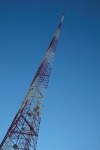 Should U.S. government funds continue to help fund NPR, a non-profit radio service? An October 2010 Poll Position nationwide survey found that 45 percent of Americans favor continuing government funding for NPR while 39 percent called for a halt to funding.
Should U.S. government funds continue to help fund NPR, a non-profit radio service? An October 2010 Poll Position nationwide survey found that 45 percent of Americans favor continuing government funding for NPR while 39 percent called for a halt to funding.
Partisan differences were found among those who favor the funding versus those who did not. Most Democrats and a plurality of independents want the U.S. government to continue its financial contributions to NPR, while most Republicans oppose continued government funding.
NPR, formerly known as National Public Radio, is a privately and publicly funded non-profit membership media organization that serves as a national syndicator to public radio stations in the U.S.
National Public Radio recently decided that it wanted to be known by its initials, NPR. The rationale for the name change is because of new media changes in the ways that programming is now transmitted — not only on radio but through various digital devices. NPR’s affiliates, which contribute about 40 percent of NPR’s $154 million operating budget, are still primarily in the radio business.
Only a single-digit percentage of NPR funding comes from the U.S. government. Public broadcasters may also receive their funding from individuals through voluntary donations, from a specific charge such as a licensing fee, or from state funding.
Public stations are licensed as non-commercial broadcasters, yet many stations transmit underwriting spots resembling advertisements on commercial broadcasting but with some content limitations, in exchange for corporate contributions.
NPR produces and distributes news and cultural programming for syndication. Individual public radio stations are not required to broadcast all NPR programs that are produced.
In a Harris poll conducted in 2005, NPR was voted the most trusted news source in the U.S.

